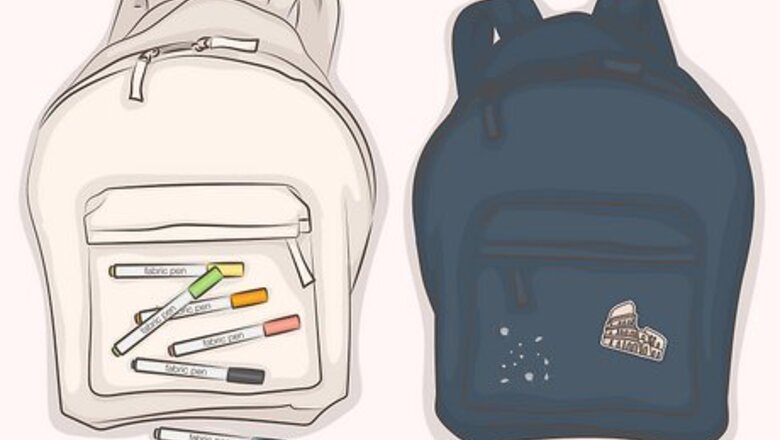
views
Getting Started
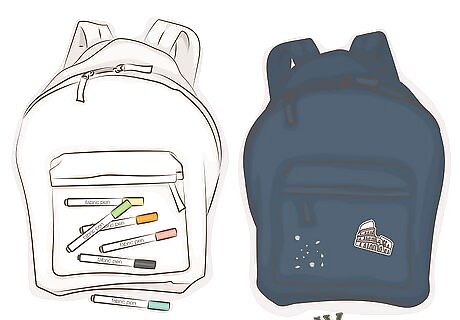
Start with blank bag with little to no decoration. Find or buy a schoolbag that has little or no design. Having a blank canvas will make the process of decorating easier and more fun! If you are planning on drawing or tie-dying your bag, you want a lighter background (e.g. white, cream, or light blue). Added colors will not show up on a dark background. Dark colors such as navy or black are better background colors if you are adding things like patches, beads, glitter, or other appliques.
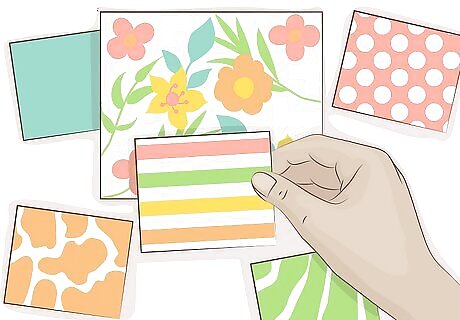
Decide what you want your schoolbag to look like. Do you want something fun and colorful? Fashionable? Or something unique that reflects your personality and interests? Before you begin decorating, think about the type of message you want to convey.
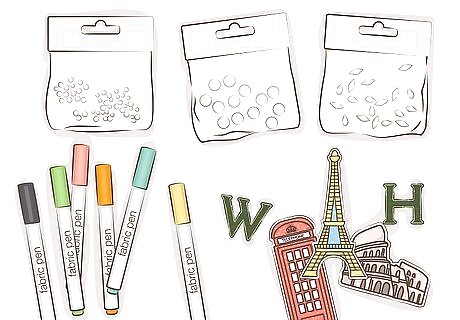
Collect or purchase all necessary supplies before you begin. Make a list of everything you need to complete your project, this will save you time and prevent stress down the road.. Look around your house or apartment for supplies, or make a trip to a craft or fabric store. Read any instructions carefully before starting any type of DIY or craft project. Do not be afraid to ask for help if needed, especially if you are inexperienced using a sewing machine, fabric dyes, or an exacto knife.
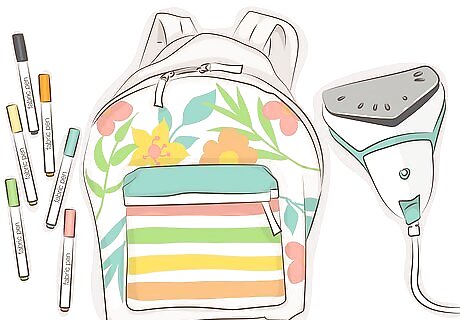
Think of your schoolbag as an empty canvas. The easiest way to customize a schoolbag is by using fabric pens or sharpies to draw anything from abstract designs to people, animals, or landscapes. Lay your bag on a hard surface and place a piece of cardboard under the fabric to provide a flat surface to draw-on, and prevent colors from soaking through. Purchase fabric pens or markers from a craft store. These come in different tip sizes, and the ink is designed to adhere to fabric. Regular permanent markers may fade or run overtime. Iron over the decorated area on a medium setting to help the colors to set. Remember you can't undo or erase your drawings. Make a sketch first on a piece of paper, and practice drawing with fabric markers on old jeans or a t-shirt before using them on your schoolbag.
Adding Patches or Appliques

Find fun appliques at fabric or craft stores. Common examples of appliques include fabric patches, rhinestones, embroidery letters, or any other small decoration that can be ironed or sewed onto fabric.
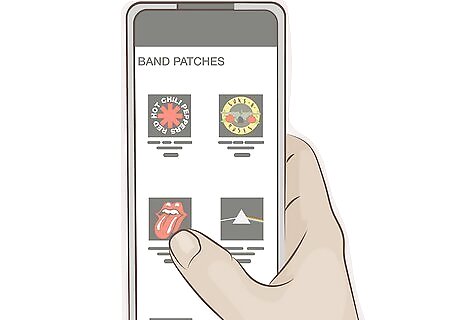
Look online or in local music stores for custom fabric patches. Fabric patches are a great way to use your schoolbag to express your personality. Consider adding patches from your favorite bands, or from places you have traveled to. If you don't sew, most patches can be applied by ironing them on or using fabric glue.
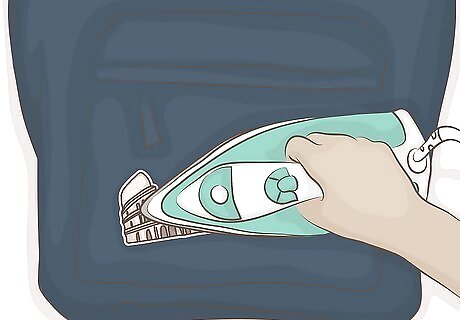
Apply iron on fabric or embroidered patches. Many fabric patches can be attached using an iron or with fabric craft glue. While these methods are not as secure as sewing, they are much easier and less time-consuming. Simply place the patch in the desired location on the bag and cover with a thin cloth. Make sure the iron is turned on and set to "dry" (not steam) at low to mid heat. Slowly press down on the patch with the iron in an up and down motion (do not move back and forth) for 30 to 40 seconds. Make sure pressure is applied firmly and evenly. Finally, turn the school bag inside out and iron the opposite side for 20 to 30 seconds to reinforce the patch. Once the patch has cooled, slide your finger around the edges to make sure it is secure. Repeat ironing if needed.
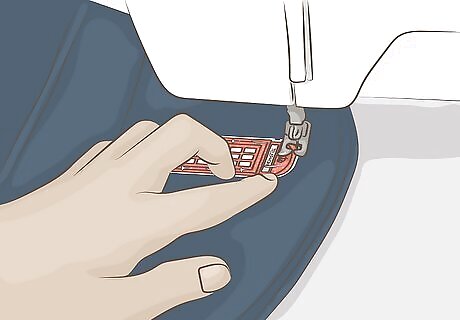
Use a sewing machine to attach fabric or embroidered patches. Sewn on patches are usually more secure and less likely to fall off in the wash than ones that are ironed or glued on. Place the patch in desired location. Use a safety pin or straight pin to hold in place. Alternatively, you can secure the patch before sewing by using a brush to apply a thin, even coat of fabric craft glue to the back. Place patch in desired location and smooth out edges. Allow to dry for at least 1 hour before sewing. Once the patch is secured, set machine to make a tight stitch and sew around the periphery. If possible, use a multi-stitch zig zag setting to create a strong, tight stitch.
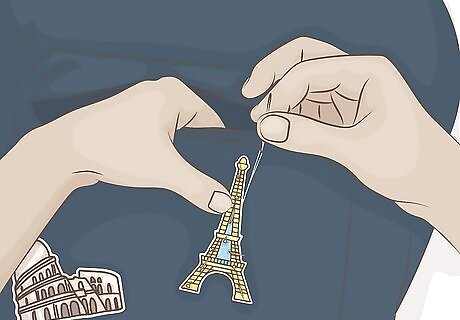
Hand sew fabric or embroidered patches. If you do not have access to, or do not know how to use a sewing machine, you can sew on patches by hand. All you need is a needle, some thread, and a straight pin or fabric glue. This may be more time consuming and your stitches will not be as even, but it is just as effective. Start as you would for a sewing machine, by securing the patch in the desired location with straight pins or for added security, fabric glue. Cut a piece of thread that is no longer than 18 inches (45.7 cm). Thread a needle and knot at one end. Start by placing the needle through the underlying fabric and pushing it through the patch. This will ensure the ends of the thread are hidden and not stick out from the patch. Stick the needle back through the patch and underlying fabric so it catches the edge of the patch. Pull the needle back through the fabric so the stitches are set not more than 1/4 inch apart. Repeat, stitching along the perimeter until the entire patch is sew on. Re-thread the needle as needed. When finished, knot the thread and pull needle through patch and fabric. Cut ends of thread and tuck under patch.
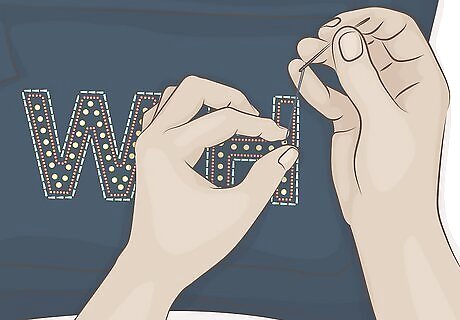
Embroider your schoolbag with beads or sequins. You can embellish your schoolbag using beadwork to form your initials, create sparkly floral motifs, or abstract designs. Beading requires fewer stitches than embroidering with thread or wool, and beads can be attached using almost any stitch. For certain hand beading, it is easier to have an embroidery hoop to help stabilize the fabric, keeping it taut so the beads will lay flat on the fabric. This way, you can have full visualization of the area that needs to be beaded. The easiest way to sew beads onto fabric is to have the right tools. Make sure your needle is thin enough to allow the bead to pass through. Some smaller beads might require smaller thinner or specialized beading needles. Draw a design or letters with chalk, or purchase a beadwork pattern from a craft or fabric store. Use a beading needle (these tend to be leaner and have smaller eyes than regular sewing needles) and select a size (10 to 15) based on your bead size. Thread the needle and tie a knot at one end of your string. Place needle underneath fabric and push through. Slide bead over needle and pull down length of thread until at fabric level. Push needle back through fabric alongside (not through center) of bead. Repeat 3 to 4 times so bead is secure before moving on to next bead. When finished or need to re-thread, tie several knots in the thread on the inside of the schoolbag and tuck under adjacent threads. This will keep the knots hidden, and prevent ends from fraying.
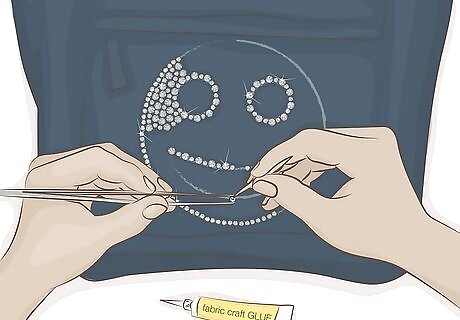
Add some glitz and glimmer with rhinestones or crystals. Purchase flat back plastic rhinestones or crystals and fabric craft glue from a craft or fabric store. Make sure you have enough rhinestones by sketching your design on a piece of paper. Use this as a template to place (do not glue) rhinestones in desired pattern, such as a sunburst or star. Sketch your pattern in chalk on your schoolbag. This way, you can wipe it off with water if you make a mistake. Glue the rhinestones on one at a time. If necessary, use tweezers to pick-up rhinestones. Use a toothpick to place a small drop of glue on the bottom of the stone and gently press it onto the fabric. Once all stones are glued on, let sit for 24 hours. While the glue should stabilize in about 1 hour, it takes an entire day to fully dry. Simply re-glue any stones that fall off.

Create an edgy look with studs. Studs come in a variety of shapes and sizes, including flat squares or spikes and are easy to attach to most schoolbags, even ones made from leather. You will need an exacto knife, small pliers, and studs purchased from a craft store. Determine where you want to place the studs. Use the exacto knife to poke two small holes. Insert your stud through the holes and using the pliers, bend the two prongs down until secure.
Creating Custom Designed Bags
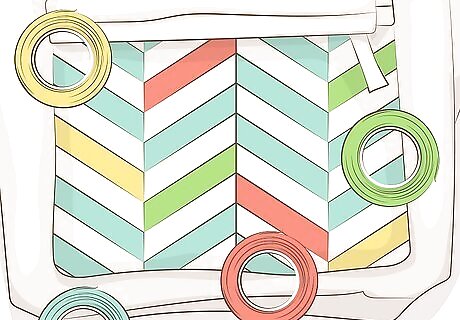
Create a custom design with duct tape. Duct tape comes in a wide variety of colors and patterns and can be ordered online or purchased from most craft or hardware stores. This method works especially well on messenger-style schoolbags since they provide a flat surface for easy application. Purchase different colored rolls of duct tape. Use scissors to cut strips that vary in length and/or thickness and simply stick to your bag. You can create a collage or geometric design. Decorate a small section or cover your entire schoolbag. Alternate horizontal and vertical strips to create a checkerboard pattern, or alternate diagonal strips to make a chevron design. Cut-out shapes (triangles, circles, squares, etc.) by placing tape stick-side down on a self healing mat. Use a ruler and precision cutting tool, such as an exacto knife, to cut shapes. Gently lift off of mat using the tip of the blade and use your fingers to press evenly and firmly onto your schoolbag.
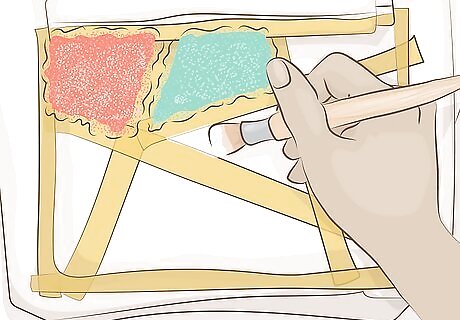
Add some sparkle with glitter. You can use metallic (e.g. gold, silver, or copper) or colored glitter to add sparkly embellishments or designs to a plain schoolbag. You will need glitter (any color), a paintbrush, painter's tape, fabric glue, and newspaper. Use the painter's tape to tape-off the section of bag you want to add glitter to. This will help create clean, straight edges. Spread a thin, even layer of fabric glue over the taped-off area using the paintbrush. Pour glitter on glue and press gently so it adheres to the fabric. Shake-off excess glitter onto a newspaper for reuse. Add more glitter until you had a solid layer. Let dry for several hours before removing tape. Glitter can get messy, so it might be better to do this outside or over a drop cloth or newspapers. This will make it easier to clean-up when you are done. If you need to wash your schoolbag, hand wash it separately in a sink and let air dry. Placing it in a washing machine may cause the glitter to fall off and stick to other clothes.
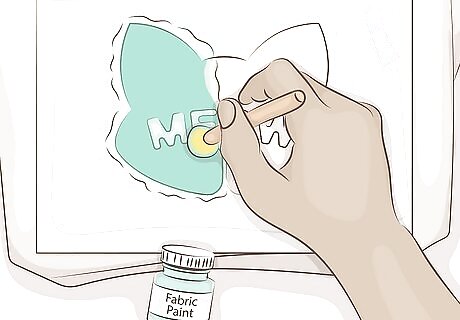
Use stencils and fabric paint to create a custom graphic design. You can make your own stencils or buy them from a craft store. Simply position the stencil in the desired location and use a sponge brush to press (do not brush or glob) paint onto the fabric in the open areas of the stencil. For detail work, use a small paintbrush to dab on paint. Let air dry. Apply another coat of paint if needed. Make your own stencil by drawing a design on cardstock or freezer paper. Use a marker to color in the areas that you want to cut out. Place the paper with your design on top of cardboard and carefully use an exacto knife to cut out the colored-in sections. Freezer paper works well for making stencils to use on fabric because it has a regular and glossy side. You can use a hot iron to fuse the glossy side to the fabric. When the paint is dry, you can simply peel off the stencil.

Tie-Dye a nylon schoolbag. If you can't find the color schoolbag you want, or want to create a tie-dye effect, consider doing-it-yourself instead of spending money on a bag you don't want. You will need to start with a light colored bag, preferably cream or white as dark colors will mask the dye. You will need acid dye, rubber bands, a stove, thermometer, and a metal pot. Purchase acid dye from a craft or fabric store and read the instructions on the bottle before beginning. Begin by twisting and bunching-up sections of your school bag and securing with rubber bands. Fill an old pot you no longer use for cooking food with enough water to cover the schoolbag but still allow it to move freely. Stir in dye (2/3 ounce of dye per 1 pound of fabric). Add schoolbag to water with dye. Heat water to 185 to 200 °F (85 to 93 °C) and let simmer for ten minutes. Add vinegar (1/4 cup vinegar per 1 pound of fabric). Maintain temperature and stir frequently for about 30 minutes. Turn-off burner and allow water and fabric to cool gradually. Remove schoolbag and wash in warm water with synthrapol or a professional textile detergent. Rinse schoolbag in cold water several times, or until water runs clear, to remove excess dye. Place in dryer on a "hot" setting to set the dye. Check the manufacturer's tag on your schoolbag to see what type of fabric it is made out of. If the schoolbag is nylon with a waterproof coating such as Gore-Tex, then you will not be able to dye it (the waterproofing will prevent any water and therefore dye from soaking into the fabric).
Experimenting with Other Ideas

Add key-chains. Like fabric patches, key-chains are a great way to express yourself. Popular themes include souvenir key-chains from your travels, favorite cartoon characters, and plush toys. You can buy mini sharpie marker key-chains. Hang these on your schoolbag so you and your friends can sign you name or draw designs at any time.

Collect buttons that reflect your personality and interests. Collect buttons from concerts, charity events, or as souvenirs. Buttons are available in an infinite array of designs, images, or sayings. Shop around and find buttons that fit your style and taste. Look online for buttons from foreign countries or foreign sport teams. Keep a collection at home and change them up frequently to keep things interesting. Avoid anything with profanity or nudity, especially when at school. Always unpin any buttons prior to washing.

Decorate several schoolbags using different techniques. Consider redecorating an old schoolbag instead of spending money on a new one, or purchase several plain schoolbags and decorate them using different color schemes, designs, and/or techniques. You can also coordinate your schoolbag's colors and designs to match a favorite outfit. Additionally, you can apply these methods to decorating other types of bags, such as totes, purses, or drawstring bags.



















Comments
0 comment